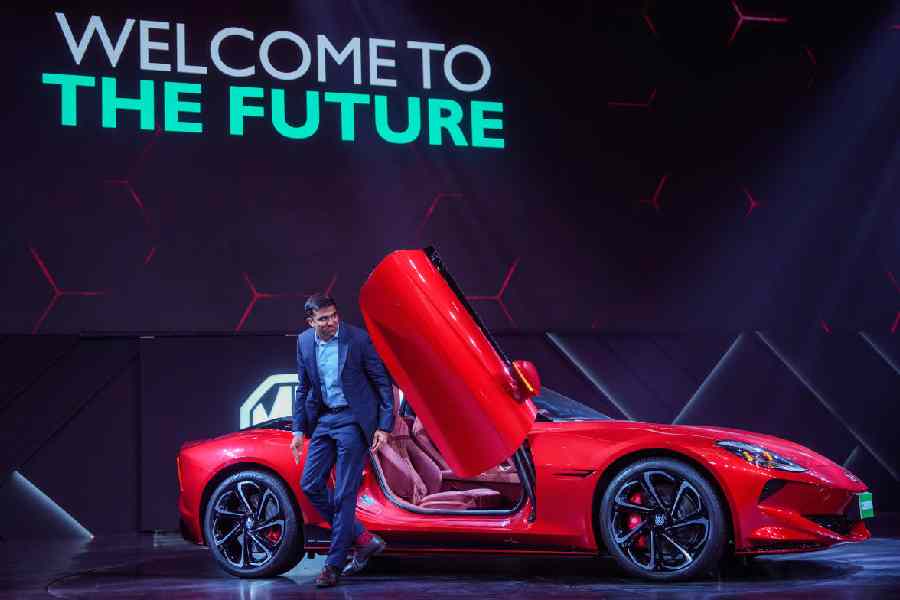JSW MG Motor India, a joint venture between SAIC Motor and JSW Group, announced plans to launch a luxury car brand called "MG Select." The company aims to introduce its first premium vehicles in the first quarter of 2025, with four models slated for release over the next two years.
This strategic move reflects JSW MG Motor India's intent to capitalize on the growing demand for luxury cars in the Indian market. The joint venture, established in December last year, focuses on producing SUVs and electric vehicles.
Despite a modest market share of one per cent in the Indian passenger vehicle segment, MG Motor is seeking to expand its presence in the premium car space. SAIC Motor, the Chinese parent company, has faced challenges in India due to government restrictions on Chinese investments.
MG Select will focus on electric, hybrid, and plug-in hybrid models, offering a curated experience to new-age customers. The brand plans to establish exclusive showrooms across India to cater to its premium clientele.
Gaurav Gupta, Chief Growth Officer, JSW MG Motor India, in a statement, said, “The traditional concept of 'purchasing' is evolving, with Indian consumers increasingly shifting towards accessible luxury. MG Select aims to position itself as a key player in this segment by offering an elevated brand experience to new-age customers, who aspire for premium brands. Infused with personalisation and driven by innovation, the MG Select experience centres will offer a curated experience to customers, blending culture, hospitality, sustainability, innovation and craftsmanship, and reimagining luxury.”
China's SAIC, which owns British MG Motor, and JSW announced the JV in December last year, with the Indian group holding a 35% stake. The firm currently makes SUVs like the Hector and Gloster, and has two electric models - the small Comet EV and the larger ZS EV.
While the company did not reveal the pricing strategy for its upcoming luxury vehicles, the carmaker said this move reflects the company’s strategic response to opportunities in the premium automotive market, particularly the rising demand for luxury products that are more inclusive, sustainable, and personalised.
This focus on a curated experience aims to differentiate MG Select in a competitive market. MG Select will establish exclusive, new-age luxury, experience centres in 12 key cities across India in Phase 1. The brand will offer a range of vehicles primarily NEVs, including plug-ins, hybrids, EVs, and more.
FADA
Meanwhile, JSW MG Motor India has secured the top spot in the Dealer Satisfaction Survey (DSS) 2024, conducted by the Federation of Automobile Dealers Associations (FADA). The company excelled in areas such as marketing, product, and after-sales service.
Mahindra & Mahindra and Hyundai followed JSW MG Motor in the rankings, while Hyundai, the previous year's leader, dropped to third place. The survey assessed six key factors: marketing, product, sales and order planning, after-sales, training, and business viability and policy.
A total of 1,377 dealer principals participated in the survey, representing approximately 4,500 outlets across India. FADA noted that slow-moving inventory and automaker policies related to sharing inventory pressures were areas that required the most improvement.
In the 4-Wheeler Mass Segment, dealers expressed concerns about buyback policies for unsold spare parts inventory and the need for support in covering carrying costs. They also emphasized the importance of dealership viability, profitability, and involvement in OEM policymaking.
Dealers in the Commercial Vehicle Segment highlighted concerns regarding vehicle sales margins, overall dealership profitability, and involvement in OEM policymaking. They were satisfied with the product range and quality of fully built vehicles, as well as the responsiveness of the OEM sales team.
In the 2-Wheeler Segment, the study revealed that dealers were concerned about OEMs' lack of support for the buyback of dead stock parts and their limited openness to dealer inputs in policymaking and multi-brand outlets. On the positive side, OEMs were found to be fair in warranty claim handling, product reliability and range, and training programs for customer-facing teams.










